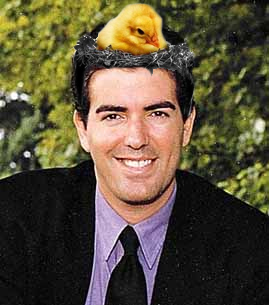So it’s especially rich that Pacelle had a blog post this week titled, “Cruelty and Ideology Masquerading as Science.” Pacelle takes issues with the recommendations of some wildlife experts that Mainers be allowed to use baiting in order to hunt bears. HSUS is pushing a ballot measure to ban this practice next month.
But who’s letting ideology drive their point of view?
On one hand, you have wildlife biologists defending the use of Maine’s practices on scientific grounds. According to the experts, baiting is needed because black bears are hard to hunt, especially in Maine’s dense woods. Banning baiting will make it harder to hunt them, and therefore there’s a likelihood of unwanted bear-human encounters increasing. See New Jersey, which after banning bear hunting entirely re-instituted hunting a few years ago following problematic encounters.
On the other hand, HSUS is trying to silence the expert voices. The group has filed a lawsuit against Maine to try to stop state employees from speaking out against the measure. (State officials have even received threats.)
While experts line up on one side, on HSUS’s side there isn’t exactly what you’d call a grassroots campaign. Over 96% of the funding for the Maine ballot group has come from HSUS or its lobbying arm. The ballot group’s leader, Katie Hansberry, is an HSUS employee and lawyer from Massachusetts, and Pacelle, who has been going door to door in Maine, is a lobbyist who lives in Washington, D.C.
Hopefully Mainers tell HSUS they can handle their own issues just well enough. And hopefully they see that this ballot campaign isn’t about trying to make hunting “fairer” or easier—HSUS has an ideological opposition to hunting and wants to make it more difficult, even if the consequences aren’t so great for residents.
Ballot measure aside, Pacelle goes on in his blog to list other cases in which one industry or another had an “ideology” that interfered with science, such as tobacco companies and smoking research. That’s not ideology, but a commercial interest. (You’d think a Yale grad would know the difference.)
Interestingly, Pacelle lists DDT as an example of commercial “ideology” allegedly interfering with science. DDT is an insecticide that was used widely to control malaria but came under scrutiny in the 1960s follow Rachel Carson’s Silent Spring. It helped eradicate malaria in the U.S. and Europe but its use was banned here and in other countries starting in the 1970s. As former New York Times writer John Tierney noted, “DDT became taboo even though there wasn’t evidence that it was carcinogenic (and subsequent studies repeatedly failed to prove harm to humans).”
However, the World Health Organization reversed its ban on DDT in 2006, a fact Pacelle doesn’t mention (if he’s bothered to keep up). The bans on DDT had a devastating effect on efforts to control malaria in the Third World, where one million people a year were dying from the disease, mostly children. DDT is quite good at killing mosquitoes.
“Opponents of DDT,” opined the Wall Street Journal, “are only ensuring more misery and death”—for people, that is. But if you’re part of the diehard cohort of animal rights activism, you believe that insects should be offered the same moral consideration as people. So perhaps the trade-off doesn’t cost you any sleep.
Ideology—real, rigid ideology—can have negative consequences. Given HSUS’s record, Pacelle shouldn’t be so quick to point his finger at others.







